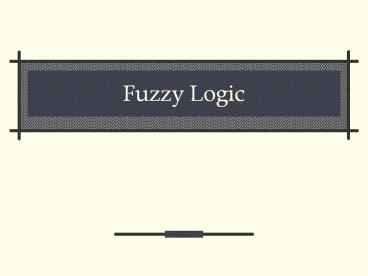Fuzzy Logic - PowerPoint PPT Presentation
Title:
Fuzzy Logic
Description:
Fuzzy logic has three principal modes of qualification: ... Probability-qualification, as in (Mary is young) in unlikely. Possibility-qualification, s in (Mary ... – PowerPoint PPT presentation
Number of Views:233
Avg rating:3.0/5.0
Title: Fuzzy Logic
1
Fuzzy Logic
2
Fuzzy Logic
- Fuzzy logic can be viewed as an extension of
multi-valued logic. - Fuzzy logic deals with the approximate rather
than precise models. - Fuzzy logic is a matter of degree.
3
Basic Differences Between Two Logics
- In two-valued logic systems, a proposition p is
either true or false. - In fuzzy logic, the truth values are allowed to
range over the fuzzy subsets of a finite or
infinite truth value set T. - The predicates in two-valued logic are
constrained to be crisp. - In fuzzy logic, the predicates may be crisp
- E.g., mortal, even, etc.
- They can also be more general
- E.g., ill, tired, tall, very tall, etc.
4
Basic Difference Between Two Logics (Contd)
- Two-valued logic allows only two quantifiers
all and some. - In fuzzy logic, it allows, in addition, theuse of
fuzzy quantifiers most, few, many,
several, much of, etc. - In two-valued logical systems, a p may be
quantified by associating with p - Truth value, true or false
- A modal operator such as possible or
necessary - An intensional operator such as know or
believe
5
Basic Difference Between Two Logics (Contd)
- Fuzzy logic has three principal modes of
qualification - Truth-qualification, as in (Mary is young) is not
quite true. - Probability-qualification, as in (Mary is young)
in unlikely. - Possibility-qualification, s in (Mary is young)
is almost impossible.
6
Meaning Representation and Inference
7
Canonical Form
8
Canonical Form (Example)
9
Inference Rules
- Categorical
- Rules that do not contain fuzzy quantifiers
- Dispositional
- Rules in which one or more premises may contain,
explicitly or implicitly, the fuzzy quantifier
usually.
10
Inference Rules (Contd)
11
Inference Rules (Contd)
12
Inference Rules (Contd)
13
Linguistic Variable
- Definition A linguistic variable is a variable
whose values are words or sentences in a natural
or synthetic language. - For example
- Age is a linguistic variable if its values are
young, anot young, and so on. - In general, the values of the linguistic variable
can be generated from a primary term (for
example, young), its antonym (old), a
collection of modifiers (not, very, quite),
and the connectives and and or. - Furthermore, each value represents a possibility
distribution
14
(No Transcript)
15
Fuzzy Car by Sugeno
16
Control Rules
17
Fuzzy Controllers
- Fuzzy controllers are modeled according to the
human behavior. - Fuzzy controllers are simpler, since they have a
smaller number of rules. - Trade-off between imprecision and simplification.































